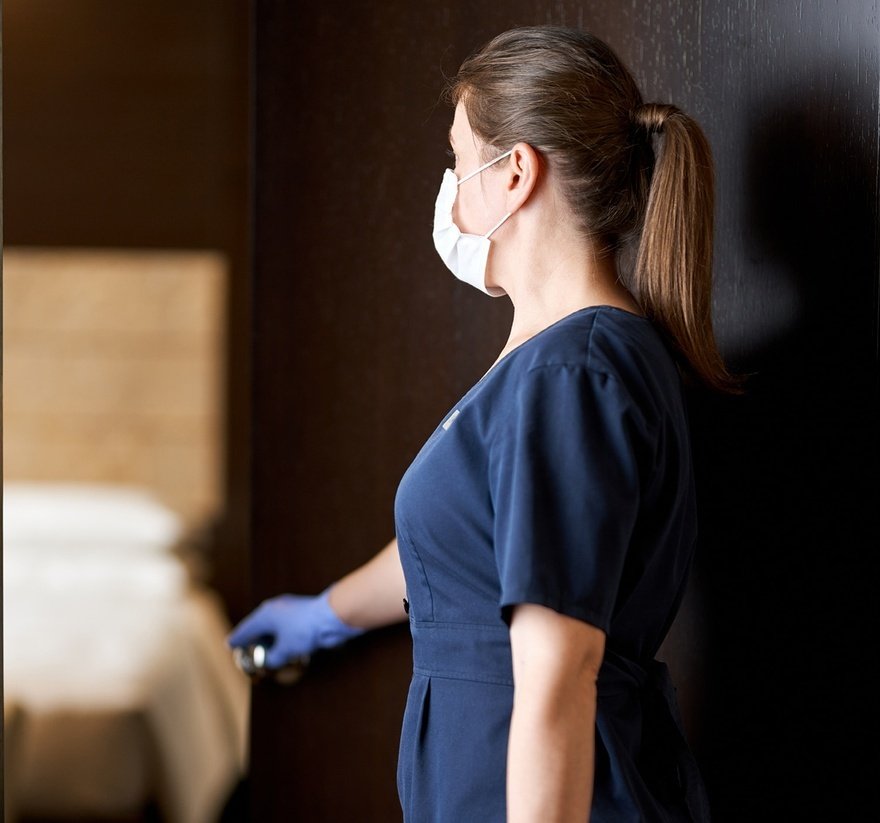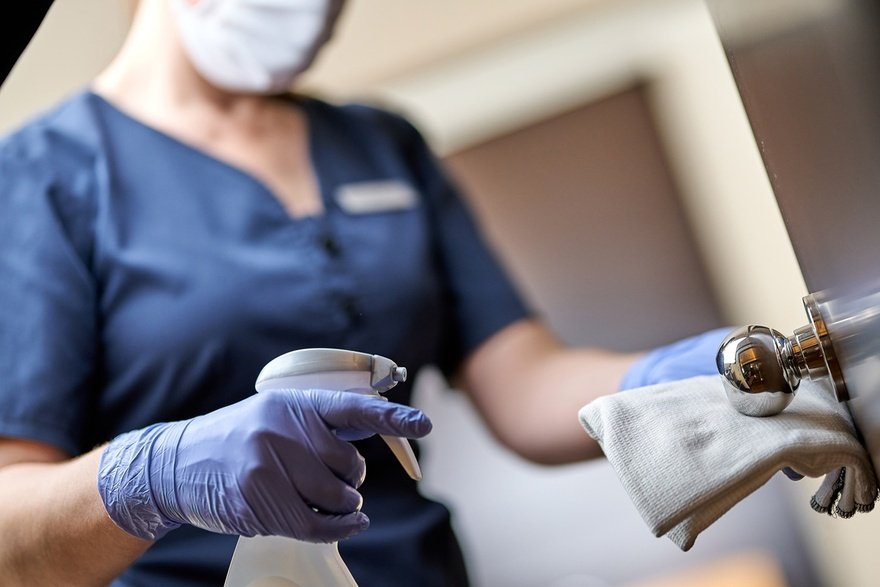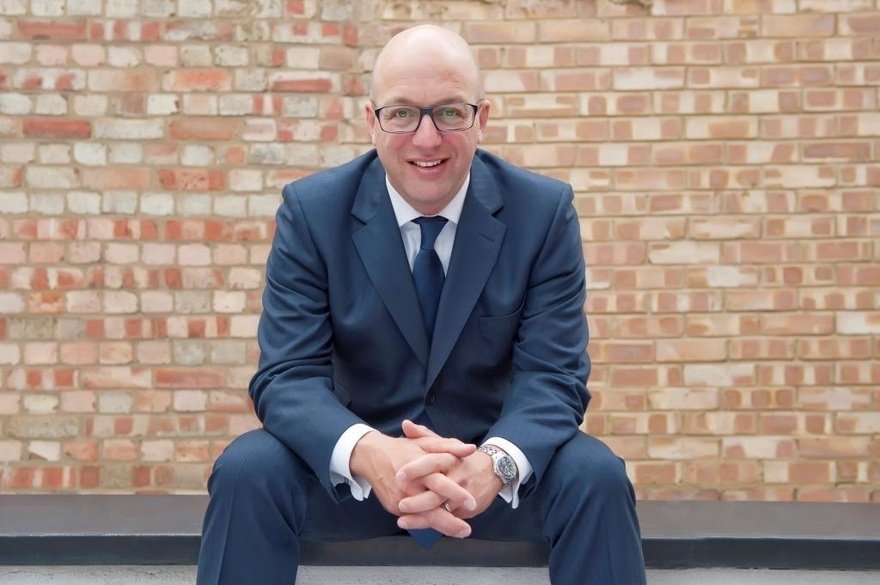How housekeeping has ramped up its cleaning regimes during Covid
The pandemic has brought an increased focus on cleanliness and hygiene, with housekeeping teams across the UK suddenly finding themselves on the front line. Amanda Afiya finds out how they're adapting their operating practices to give their customers more confidence.
The driving force for any hotel, no matter what level it's operating at, is giving the customer the best possible experience from check-in to check-out.
At the heart of all this is, of course, standard operating procedures (SOPs) that ensure a customer's journey is smooth. But those SOPs were blown out of the water last year when Covid-19's vice-like grip spread across the globe.
While each country has fought the pandemic in different ways, in the UK the hospitality sector has been on a rollercoaster of a journey with stop-start government announcements outlining the various levels at which the industry could or couldn't operate. Up and down the country, SOPs were scrutinised and rewritten with an enhanced focus on protecting the safety of both guests and staff, and, critically, preventing the spread of the virus.
For housekeeping departments, responsible for maintaining high standards of hygiene and cleanliness in their establishments, the battle against coronavirus came right to their doors. Katrina Pascazio, operations manager of Cameron House Lodges on Loch Lomond, confides: "When establishments were open, housekeepers were literally putting their lives on the line – stripping beds, dealing with used towels, cleaning bathrooms – never knowing if the person who had departed five minutes before they entered the room had coronavirus.
"Between furlough, flexi-furlough, redundancies and lack of job security, life has been very difficult for some housekeepers," she continues. "Seeing colleagues and friends lose their jobs and not find alternative employment, and the news of some hotels and serviced apartments closing permanently, has led to a lack of confidence in the housekeepers that I personally know."
Extensive work has been undertaken within the sector to ensure that employees are safe. Personal protective equipment is now standard, and hotels have reworked their cleaning procedures to reduce the possibilities of cross-contamination. Coupled with nationwide vaccine roll-out, the sector is hopeful that when it comes out of lockdown, it's for the final time.
"It's been a stop-start sort of a year from March of last year," says Rachael Park, head of housekeeping at Rudding Park in Harrogate. "The first lockdown was a very steep learning curve, but by the third lockdown we had everything reorganised and under control. The pandemic has affected the housekeeping department to a great degree in all aspects of our daily processes. It has thrown so many obstacles into the housekeeping routine, such as increasing the amount of time it takes to service a bedroom, the fogging of public areas and leaving bedrooms fallow between guests' stays."
The housekeeper's tale
Not surprisingly, all of the housekeepers and operators The Caterer spoke to report an increase in cleaning times in their respective properties. Social distancing, for example, has restricted some housekeeping teams from their usual "buddy" system of working in pairs. Increased cleaning and disinfecting of all touchpoints in bedrooms and public areas, taking place regularly through the day, has also added to the workload.
"Cleaning regimes will continually change, and enhanced products will come on the market," predicts Pascazio. "Guest expectations will be higher than before – nothing short of immaculate will be expected at all times with no room for error."
Guest expectations will be higher than before – nothing short of immaculate will be expected at all times
KK Prabakaran, executive head housekeeper at Dukes London, is pleased, however, that housekeeping will be at the forefront of any hospitality business's reopening plans. "As we transition from the conventional methods of cleaning towards a more health-conscious post-Covid-19 clinical methods, it is imperative that each team member understands the basic science behind cleaning and becomes more than ‘just a housekeeper'.
"With all the new, visible hygiene measures in place, guests will want to witness those cleaning methods first-hand in order to give them confidence. In a way, it will be like the provenance of what we eat and drink and how those things are made."
Guests will want to witness those highest cleaning methods first-hand, giving them confidence
For Optimum Hotel & Management, which manages four hotels, while its marketing platform, Luxury & Boutique Hotels, markets 10 hotels, the past year has resulted in some upswings as well. Managing director Gregor Ritchie says: "We've been able to use the time to ensure the properties ‘present well', with two hotels starting a refurbishment programme. Staff members have been great and willing to help, learning new skills and being incredibly supportive. For example, we now have a head chef completely trained in working on reception."
Like many others, Ritchie states that bedspreads, scatter cushions, notepads, pens and guest directories have been taken out of rooms. "We have sourced a lovely, personal, pocket-size hand sanitiser for all guests, masks and a welcome letter from each general manager, reassuring guests of the high levels of protocols, as well as paperless check-in and check-out.
"The housekeeping department has its own checklists, keeping track of what gets done and when, and, in doing so, has become much more efficient, too. In all this change and disruption, some really good operational standards have come to the fore that will remain embedded in all that we do."
In all this change and disruption, some really good operational standards have come to the fore that will remain embedded in all that we do
Step it up
While previously hotels would have undergone a lot of overnight cleaning in an attempt to be as discreet as possible, it is apparent that guests now want to see cleaning with their own eyes, says Laura Cameron, operations director at Philema Hospitality Management, which operates Fistral Beach hotel and spa, the Esplanade hotel and Boringdon Hall hotel and Gaia Spa, all in the south-west.
"We initially reduced the frequency of room cleaning and it was on a request basis, but this was removed in September after guest feedback. Guests can now opt out of room services if they so wish."
Soft furnishings were removed from bedrooms at Philema properties early on in the pandemic, but they have since been reintroduced thanks to the use of Zoono sanitiser surface sprays, which are also used on loungers by the pool.
"We've also removed our turn-down service and keep teams to certain floors to reduce overlaps," Cameron explains. "We generally spend 30-40 minutes cleaning bedrooms, but with the introduction of the new protocols, it takes about another 10 minutes. Although a lot of the key touchpoints were already covered, going back over these touchpoints multiple times and double-checking has led to increased times."
Gordon Campbell Gray, owner of the Wee Hotel Company, which includes the Three Chimneys on Skye and the Pierhouse hotel and restaurant in Port Appin in Argyll, says the last 12 months have been equally testing for his teams, too.
"The past year has certainly been challenging as we manoeuvred our way through the various rules and regulations, in addition to dealing with the stop-start opening and closing scenarios.
"The job of housekeeping is physical and heavy anyway, but since we now have a three-step cleaning process of disinfecting, cleaning and disinfecting again, it is far more time-consuming," he says, adding that while the business prefers to use plant-based green cleaning materials, it is currently having to use heavy-duty chemical products.
Like many, the Wee Hotel Company has a three-point, step-by-step cleaning and sanitation process for each room, with no access after the room has been sealed. Time is also left between guest checkout and staff entering the room, and the housekeeping teams are using sanitising/electrostatic fogging machines pre-cleaning, and for the deep cleaning of each room. As a result, check-in times have been pushed back by an hour.
While the 215-bedroom Grove hotel in Chandler's Cross, which has just undergone a 138-bedroom refurbishment, didn't make any roles redundant, choosing instead to use furlough and flexi-furlough throughout the pandemic, it now finds itself carrying out interviews for 13 new staff.
Executive housekeeper Amelia Lawrence says: "The new team members will ensure we are covered for minimum occupancy, but we expect to be very busy once we reopen and we will need to supplement the team with casual employees and agency staff. My hope is that the agencies will be able to keep up with the demand, but, in the meantime, our staff are happy to take on extra hours which we can give back to them later in the year."
It's too early to say how the flow of staff from Europe has been affected by Brexit, says Lawrence, but she does feel that, eventually, it will have a dramatic impact on housekeeping teams. "We must look to the UK workforce and change their perception of working in hospitality," she says. "If the NHS can advertise for nurses and the armed forces can advertise for personnel, why can't hospitality do the same?"
The impact of Brexit
While Nick Appell, co-founder and chief executive of specialist cleaning firm Casna Group, has been able to retain most of his team during the pandemic, he is concerned that the impact of Brexit could see housekeeping facing a skills crisis in no time at all.
"So many Europeans and, in particular, eastern Europeans, have gone home, and while initially everyone felt there wasn't going to be a shortfall of labour because of redundancies in the marketplace, I do believe that the hospitality jobs market is going to be challenging.
"Housekeeping is undoubtedly an extremely tough job, and in order to find and attract the right people, it's about paying very good money. I sincerely hope that Central London hotels will work towards the London Living Wage as a matter of course," he says.
"We've got a fantastic vaccination programme and I believe we will be seen as a safe haven, and when the American and Middle Eastern guests are given the green light and are back in the air, London will see a flood of people arrive. There is such a desire for people to go out, spend money and have a good time; I think it's going to be like the roaring 1920s. This is when the industry will need its brilliant workforce more than ever. London has never experienced a reopening like this, where almost every hotel is going to be opening on the same day."
Gillian Thomson, director at ACT Clean, believes everyone will need "a totally flexible approach to everything" at the moment, until the industry is back on its feet and fully staffed. "We need to work in advance as much as possible, to plan, and to be open and honest with team members about what work is available.
"And if we do find that Brexit makes recruitment more difficult as the volumes required reinstate to previous levels, outsourcing saves time in the recruitment of very low-level, ordinarily high-turnover positions. Taking into account the time saving, the value and the clearer culture, it might make sense to find a partner that can do that for you and to work collaboratively to make sure everybody's resources are focused in the right way."
Thomson believes attitudes are changing and is pleased that two clients are talking about "culture, looking after people and respect" when discussing partnerships.
"Three of our clients – that's groups, not just single properties – already pay above the living wage. They have recognised that, for at least the last three or four years, that if you want to get regular, reliable, experienced people who become part of the team and interact well with your guests, especially where you have serviced apartments or long stay, that if you pay that little bit more it achieves all those things."
As things stand, Thomson says the industry simply doesn't know what's in store beyond 30 June, which is the deadline for settled status for EU citizens.
"Much will depend on many economies and people's confidence. We are mostly just delighted to be getting back to work. We won't see pre-pandemic levels for a long time, but you only have to go out in London this past week to see how busy it is and feel a sense of optimism."
The wellbeing of housekeepers
Lorraine Dale, head housekeeper of the Royal Household, and chair of the UK Housekeepers Association, has long since been troubled about the wellbeing of fellow housekeepers, with concern for her colleagues pre-dating the pandemic.
"Before Covid hit, I felt they were already going through a bad patch, feeling stretched and under-resourced," she says. "And then, all of a sudden, housekeepers were on the front line and considered heroes. We were riding high, we were great, but with Covid, your expenses are quite high and so it wasn't long before businesses started to review budgets."
It was at this point of the pandemic that the association – the largest of its kind in Europe – became aware of the impact a lack of trade in the hospitality sector was having on teams. "Some executive and head housekeepers were made redundant, and we now hear that some hotels are using deputies or floor housekeepers to run departments," says Dale. "There just aren't enough people to be doing the job that they are supposed to be doing, let alone dealing with the Covid side of it as well. I get that the safety of our guests is paramount, but the safety of our staff is too."
I get that the safety of our guests is of paramount importance, but the safety of our staff is too
Long-term effects on budgets are unavoidable, says Dale: "And I'm not convinced that the ramifications are truly being considered. Cleaning times are going to be extended, the amount of cleaning products consumed is going to increase, then the pressure on housekeeping teams to start cutting cleaning times again will no doubt creep in… On top of all this, so many housekeepers are struggling to get teams together because of the pandemic as people have returned home or rethought their careers.
"Of course, I understand that everyone has had to rethink things, but I really do think we're in for a tough year in housekeeping," says Dale.
"We need general managers to continue to support their housekeeping department, while understanding the different types of challenges that we will endeavour to meet over the next 18 months. But right now, I'm concerned about where housekeeping is going."
Images by Friends Stock/Shutterstock.com
Continue reading
You need to be a premium member to view this. Subscribe from just 99p per week.
Already subscribed? Log In








